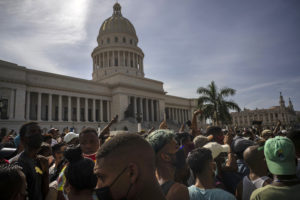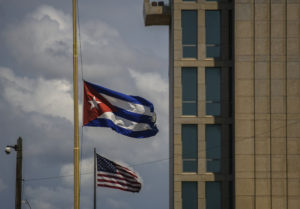I was in a meeting in Havana with my colleague Ana Sorrentino when the news started to break. We were at the Ministry of Public Health, discussing Cuba’s role in the battle against Ebola in Africa, when one of the Cubans got a tweet: “Alan Gross is on his way home,” she announced. A secretary then burst into the conference room breathlessly repeating the news. Our conversation came to a halt, as both North Americans and Cubans took in the news and its implications. We all looked at each other and then a Cuban official came over to embrace us. The woman who had first announced the news had tears in her eyes. We took a group photo, Cubans and North Americans together, knowing that the news signaled historic changes in the U.S.-Cuban relationship.
We all knew that the prisoner releases meant a breakthrough in the U.S.-Cuban relations, but we weren’t prepared for how dramatic the changes would be. We hurried from our meeting back to our hotel to hear President Obama on TV. As we pulled up, we could hear the voice of Raúl Castro, Cuba’s president, and a group of taxi drivers and passersby stood raptly listening to his remarks on the radio.
In the hotel lobby, Obama appeared on the television. As he spoke, the crowd grew and then became silent. There were visiting North Americans in Cuba for the Jazz Fest. There were European and Canadian tourists. There were Cubans at the hotel for meetings with visitors, and as the talk went on, they were joined by the desk clerk, the bartender, the maître d’ at the restaurant, and others from the hotel staff. The crowd grew as the magnitude of the changes became clear. When President Obama finished speaking, there was a second of silence, and then spontaneous applause.
From @WOLA_org team in Cuba: “We literally saw Cubans in tears of happiness. People are enthralled.” #CubaPolicy pic.twitter.com/VAsa7hj9LR
— WOLA (@WOLA_org) December 17, 2014
Church bells sounded in the street after the announcement, and a jubilant student demonstration, with several hundred participants, passed by our hotel, waving the Cuban flag and chanting. There was a widespread sense that the direct conversation between President Obama and President Castro, the remarks by both leaders, and the expectation that they would meet in person at the Summit of the Americas in April, had put the relationship on a new footing. Cubans felt proud that their country was recognized by the United States as a member of the hemispheric community.
Rumors had circulated all week that something was going to happen. “The rumor around town is that Alan Gross is going home sometime soon,” a European diplomat told us in confidence. But no one was prepared for the boldness and the magnitude of the changes. President Obama talked about normalizing the relationship between the two countries, re-establishing diplomatic relations, expanding trade and travel, along with the prisoner releases that brought Alan Gross, three Cuban agents, and a number of other prisoners back to their families. Cubans heard the whole speech, of course. They knew that President Obama was critical of the human rights situation on the island, and many of them were eager to see more freedom of information and debate, and more economic opportunity. But they were delighted by the shift toward more normal relations, and they hoped that it would bring progress in Cuban society.
In the aftermath of the announcements, Cubans went back to their work, and began to think about the future. “The changes will take time,” a taxi driver told me, “but I think things will improve.” Many of the Cubans we talked to hope that the new U.S.-Cuban relationship would help stimulate their economy and speed the process of economic change underway. And many expressed hope that they or their children could some day visit the United States, as the relationship improved. Our taxi driver longed to see Las Vegas and New York City.
It is going to take many months to turn the agreements that were announced yesterday into practical realities. Travel from the United States to Cuba will pick up, and trade and investment in the emerging small business sector in Cuba will increase, but both processes will take time. Access to the internet and telecommunications will also grow, but it will take time to put the technology in place. The impacts on the economy and on the freedom of information will be real, but gradual. What’s going to matter most, and what will make a difference right away, is the sense of hope and possibility that yesterday’s announcements generated.


